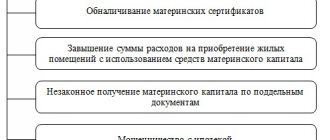The popularity and convenience of non-cash payments attract not only ordinary citizens, but also scammers. An example of this is statistics. Thus, in the first half of 2022, 6,613 cases of fraud using electronic means of payment were registered, which is 8 (!) times more than in the same period in 2022. Let us note that the crime provided for in Article 159.3 of the Criminal Code of the Russian Federation is one of the most complex and difficult to investigate forms of theft, therefore the act is characterized by a high degree of latency.
Article 159.3 of the Criminal Code of the Russian Federation - Fraud using electronic means of payment
Fraud using electronic means of payment means the theft of someone else's property using someone else's (fake) bank card (credit, debit, etc.) by deceiving an employee of a credit, banking, trade and other organization.
An electronic means of payment (in accordance with the Federal Law of June 27, 2011 No. 161-FZ “On the National Payment System”) is a means or method that allows a client of a money transfer operator to draw up, certify and transmit orders for the purpose of transferring funds within the framework of applicable forms of non-cash payments using information and communication technologies, electronic storage media, including payment cards, as well as other technical devices.
Writing off money from someone else's bank card: fraud or theft?
April 22, 2022 4:53 pm
Lawyers were told about the qualifications of non-cash thefts
On April 22, Doctor of Law, Professor of the Department of Criminal Law and Criminology, Faculty of Law, Moscow State University, spoke to the audience of the FPA RF webinar on advanced training for lawyers. M.V. Lomonosov, member of the NCC at the Supreme Court of the Russian Federation, editor-in-chief of the magazine “Criminal Law” Pavel Yani. He gave a lecture on the topic “Qualification of theft of non-cash funds.”
At the beginning of his speech, the speaker noted that in any monograph of previous years one can find a reference to three criteria for recognizing property as the subject of theft. Among them is the so-called physical sign, which stipulates that the stolen property must be a thing. According to the scientist, for many years the courts, following the explanations of the Plenum of the Supreme Court of the Russian Federation in 2007, charged the fraudster who encroached on other people's non-cash funds with the crime under Art. 159 of the Criminal Code of the Russian Federation. At the same time, they qualified the act not as the acquisition of rights to someone else’s property, but as theft.
The fact is, the expert explained, that there are two types of fraud, one of which is a form of theft (theft by deception), and the second is the acquisition of rights to someone else’s property. And if the signs of theft are explained in paragraph 1 of the note to Art. 158 of the Criminal Code of the Russian Federation, there are no explanations in the law about acquiring the right to someone else’s property.
Pavel Yani emphasized that the civil doctrine, as well as a number of practitioners, in some cases establish a regime of things for uncertificated securities and non-cash funds, but still this does not fill the category “Right to someone else’s property” with content. The Supreme Court of the Russian Federation, in Resolution of the Plenum of November 30, 2017 No. 48, indicated the need to qualify the theft of property using someone else’s bank card not only by receiving cash at the terminal, but also by transferring it from the owner’s account to the account of the attacker or other persons as theft .
“Moreover, you should pay attention to the fact that, civilly, a person who has entered into an agreement to open a bank account is the owner of the account (and not the funds in the account), while the Plenum of the Armed Forces of the Russian Federation interprets this person as the owner of the funds in the account,” the lecturer noted . “Thus, we are dealing with the definition of the category of theft, as well as the subject of theft, and the extension of these norms to non-cash funds.”
The expert added that subsequently amendments were made to the Criminal Code of the Russian Federation. Thus, the legislator expressed an unequivocal position that the subject of theft is not necessarily a thing.
Pavel Yani noted that on the interpretation of the provisions of Art. 159.3 and 159.6 of the Criminal Code of the Russian Federation there is a lot of debate, but a clear understanding has not yet been developed.
The first question, in particular, concerns Art. 159.3 of the Criminal Code of the Russian Federation: did the legislator, together with the wording of the norm, change its content? “At first glance, definitely yes,” says Pavel Yani. – If previously criminal liability was provided for fraud using payment cards, – i.e. theft of someone else’s property using a counterfeit or a payment card belonging to another person by deceiving an authorized employee of a credit, trade or other organization - then from April 2022 the offense is formulated as fraud using electronic means of payment.” According to the speaker, such an interpretation of clause “g” of Part 3 of Art. 158, when the theft of cash from someone else’s bank card against the will of its holder should be qualified as theft from a bank account.
The lecturer also touched upon the problem of recognition as a victim depending on the type of card from which the theft was committed (debit or credit). According to him, in some regions of the country, judicial practice develops in such a way that when using a credit card seized from another person against his will, the credit institution (bank) is recognized as the victim, and in the case of a debit card, the account owner (card holder) is recognized as the victim. The courts proceed from the fact that when using a credit card, funds are directly credited to a third party or transferred to the thief, bypassing the victim.
Pavel Yani stated his disagreement with this position. “In accordance with the Regulation of the Bank of Russia dated December 24, 2004 No. 266-P (as amended on January 14, 2015) “On the issuance of payment cards and on transactions performed with their use,” the bank in a number of cases undertakes to otherwise the person who dials the PIN code fulfills the instructions of the person who placed this card in the terminal. If it is a credit card, in this case the bank will credit the requested amount to the cardholder's account. Accordingly, funds are stolen from the cardholder’s account, so the victim should be recognized as the victim, not the bank,” the lecturer explained.
Returning to the question of whether the content of Art. 159.3 of the Criminal Code of the Russian Federation, Pavel Yani noted that in paragraph 17 of the Resolution of the Plenum of the Supreme Court of the Russian Federation No. 48, the content of this norm in its previous wording was explained.
As an example, he cited a case where a guilty person informs an authorized employee (cashier in a store) of knowingly false information about the ownership of a payment card or is silent about the fact that the card with which he pays does not belong to him. “Counterarguments regarding the position of the Plenum of the Armed Forces of the Russian Federation from a number of my colleagues are that the cashier is not obliged to identify the owner of the bank card when paying for a purchase,” noted Pavel Yani. At the same time, his own position is that in accordance with the rules of turnover established by the Civil Code of the Russian Federation, each participant is obliged to presume the good faith of the other party. “That is, by the very fact of using the card, by presenting it, the guilty person claims that he is acting legally. Thus, it misleads the cashier,” the scientist believes.
At the same time, he noted, if you recognize the card holder or the bank as a victim, then these persons are not misled, but a third party is misled. “Indeed, in 1986, the Plenum of the Armed Forces of the Russian Federation classified as fraud only the actions of the perpetrator aimed at misleading the victim, who as a result transfers his property to the perpetrator or other persons. But already in 2022, this point of view was rejected, and the Plenum of the Supreme Court of the Russian Federation, in paragraph 1 of Resolution No. 48, indicated that in case of fraud, not only the victims, but also other persons who transfer property (the right to property) can be misled to another person, or do not prevent its withdrawal by another person,” the speaker explained.
Pavel Yani drew attention to the fact that, according to the provisions of Art. 159.6 of the Criminal Code of the Russian Federation, fraud using electronic means of payment presupposes the presence of a misled person making a decision on the transfer of property. “This is a good norm, but the indication of fraud in it is superfluous,” he noted, adding that, in the opinion of the Plenum of the RF Armed Forces, this norm contains a description not of the elements of fraud, but of a type of theft. Thus, the expert concluded, the meaning of the changes made to Art. 159.3 of the Criminal Code of the Russian Federation, consists of expanding the list of means of committing a crime.
At the end of the lecture, the speaker answered numerous questions from the webinar participants.
Please note that today, April 22, the webinar will be available until 00.00 (Moscow time). The broadcast will be repeated on Sunday, April 26.
Tatiana Kuznetsova
SharePrint Direct link to the material:
Share
Punishment for committing fraud with payment cards (Article 159.3 of the Criminal Code of the Russian Federation)
Punishment for committing this crime includes both a fine and long-term imprisonment.
For example, for committing fraudulent actions with payment cards as part of an organized group or causing damage in the amount of over 6,000,000 rubles, the punishment includes imprisonment for up to 10 years with a fine of 1,000,000 rubles.
The minimum punishment for committing card fraud involves a fine of up to 120,000 rubles.
If fraud is committed by a person using a counterfeit payment card, then this act will be classified as a set of crimes (Article 327 of the Criminal Code of the Russian Federation and Article 159.3 of the Criminal Code of the Russian Federation).
Minority of the act
In judicial practice, acquittals under Art. 159.3 of the Criminal Code of the Russian Federation are rare due to their insignificance. This is due to the fact that the courts, at the request of the investigation, terminate cases with the application of a judicial fine and on other non-rehabilitative grounds.
However, there were also cases when the court applied the norms of Part 2 of Art. 14 of the Criminal Code of the Russian Federation on the insignificance of the act with reference to paragraph 33 of Resolution No. 48, which provides the following explanations: “if the actions of a person during fraud, misappropriation or embezzlement, although formally containing signs of the specified crime, but due to their insignificance did not pose a public danger, the court terminates criminal case on the basis of Part 2 of Art. 14 of the Criminal Code of the Russian Federation."
In paragraph 25.4 of Resolution No. 29, the Plenum of the Supreme Court of the Russian Federation, when considering cases of theft, including theft from a bank account, also recommended that courts take into account the provisions on the insignificance of the act. In this case, the courts must take into account the totality of such circumstances as the degree of implementation of criminal intentions, the size of the stolen goods, the role of the defendant in the crime committed in complicity, the nature of the circumstances that contributed to the commission of the act, etc.
Defense in criminal cases of fraud using electronic means of payment
Work on a criminal case initiated on the grounds of a crime under Article 159.3 of the Criminal Code of the Russian Federation has a number of specific features.
So, to qualify the committed act under Art. 159.3 of the Criminal Code of the Russian Federation, the preliminary investigation or inquiry authorities must prove the fact of intent to steal funds from a bank card before they are directly received.
In addition, the commission of this crime is possible only in the commodity-monetary sphere, for the purpose of purchasing goods or services, including on the Internet, or withdrawing cash.
If you are accused of committing a crime under Article 159.3 of the Criminal Code of the Russian Federation, you should immediately contact a lawyer for economic crimes, since even at the stage of verification carried out by the operational unit, it is possible to solve the problem that has arisen.
Defense by a lawyer of an accused of committing fraudulent actions in payment cards consists of providing the necessary legal assistance, expressed in the analysis of the evidence base available to the investigation, developing a position on the case and work strategy, identifying inadmissible evidence, legal assistance in exercising the full scope of rights available to the client , especially at the time of interrogation, search, identification or confrontation, etc.
Distinction of acts under Articles 158 and 159 of the Criminal Code of the Russian Federation
In cases where the perpetrator does not mislead the victim, but acts in secret from her, the actions of the perpetrator should be qualified as theft. This conclusion is fully consistent with paragraph. 2 clause 25.1 of Resolution No. 29 “under clause “d”, part 3 of Art. 158 of the Criminal Code “qualifies the actions of a person in the case where he secretly stole funds from a bank account or electronic funds, using the confidential information of the owner of the funds necessary to gain access to them.” For example, personal data of the owner, payment card data, control information, passwords.
ATM fraud
ATMs are less likely to become victims of fraudsters, security cameras pose a certain danger to criminals, but they also end up on the pages of criminal chronicles. Most methods of stealing funds using ATMs came to Russia from the West; they require the use of special technical devices.
Skimming
This model of an attack on the funds of individuals who use the services of ATMs to withdraw cash involves installing a small device in the ATM that “collects the cream” - copies all the data from the magnetic line of the bank card. Together with it, a device can be installed to retrieve information about the PIN code when entering it. Interestingly, such devices can also be installed in stores; they will copy information when purchasing goods and paying with a bank card. The skimming device is offered for sale for only a few tens of thousands of rubles, which leads to the fact that employees servicing ATMs detect them up to 1,200 times a year.
Assuming that this equipment is installed at a remote ATM installed in a secluded place, it is better to contact the bank via the “hotline” (its telephone numbers are on almost every ATM) and find out whether the institution uses anti-skimmers.
Lebanon Loop
Another method of theft or fraud is when criminals try to steal a bank card as a physical object. The card reader is equipped with special devices that capture the card and prevent the user from getting it back. It takes him a few minutes to contact the support service, and during this time the scammers try to remove the plastic from the ATM themselves. The latest ATM models exclude the possibility of using this method of theft; the card will remain in the device until the collectors appear.
ATMs are constantly being improved, in Russia the risks of suffering from skimming and other similar types of fraud are minimal, but on tourist trips to less developed countries you need to remember the existence of these types of dangers and withdraw money from ATMs of unknown foreign banks as little as possible. There are also frequent cases of installation of counterfeit ATMs abroad. They show a software malfunction, while reading all the necessary information from the bank card.
How money is stolen from ATMs
In the spring of 2022, banks themselves began to suffer from ATM fraud. A new virus has appeared that infects the device. After that, when a certain sequence of numbers is entered into it, it gives out funds to the attackers. While the widespread use of this method in Russia is unknown, banks have begun to change their software to prevent this virus from functioning.
Lending fraud
A frequent problem, along with the development of consumer lending, has become fraud in the credit sector, which involves issuing a loan agreement or receiving funds without the intention of returning them. In order for the court to recognize the failure to return funds to the bank as banking fraud or fraud in the field of lending, the following signs must be simultaneously present when committing a crime:
- premeditated intent to not repay funds already upon concluding a bank loan agreement;
- providing a bank employee with knowingly false or unreliable information about the borrower and his solvency, deliberate misrepresentation;
- lack of a real opportunity to repay the debt or, in the case of legal entity borrowers, instant cashing out of loan amounts, their misuse.
Thus, A. Esin, a borrower from Promsvyazbank, was recently arrested in connection with a criminal case. Investigators found that he had intent to commit theft of bank funds and intentional non-repayment of loan funds received for companies controlled by him. Loans in the amount of 500 million rubles, based on the position of the investigators, were not used for business needs. The defendants “disposed of the money at their own discretion.” The total amount of unreturned funds exceeded 4 billion rubles. Such high-profile cases are more common among problem banks; most attempted credit frauds are committed in the field of consumer lending. The most common types of it are issuing a consumer loan for a small amount to purchase goods in a store, in which the borrower is checked using scoring programs based on the information provided by him, and car loans, as a result of which the car - the collateral - is allegedly stolen. In the second case, the risks are borne by the insurance company.
But recently a new type of fraud has appeared with money from both banks and clients at the same time. Investment companies that have appeared and do not have a license to operate in financial markets offer pensioners to take out loans and give them money to manage, offering high income. Such companies rent offices in prestigious business centers and use aggressive advertising. As a result, both clients, who lose their money to the scammers, and banks also become victims. If banks have the opportunity to recover their funds by bringing pensioners to court, then the victims are unlikely to see their money when the investment company disappears along with the office.
Investigating credit fraud and recovering funds in cases where the perpetrators of the crime are trained professionals requires the highest qualifications from both bank security officers and law enforcement agencies. At the moment when it is clear that the funds will not be returned to the bank, when a criminal case is initiated, they end up being transferred, sometimes abroad, and legalized, and the companies go bankrupt. At the same time, the peculiarities of the functionality of security services do not allow them to understand the intricacies of financial schemes; investigative authorities also do not yet have extensive experience in investigating this type of crime, especially when the traces of stolen money lead abroad. It is necessary to order complex examinations and establish a chain of connections in order to prove the presence of intent to commit fraud. How deeply bank employees are involved in a particular fraud will determine how well the evidence of intent is hidden. Any deliberately prepared scheme can be attributed to a financial crisis or difficult life circumstances, but evidence of collusion with bankers will help eliminate the court’s doubts about the presence of intent to steal.
The ways to seize other people's money, related to deception and abuse of trust or using modern technical means, are diverse. You can protect yourself from them only with absolute care. You should not fall for the tricks of scammers.




